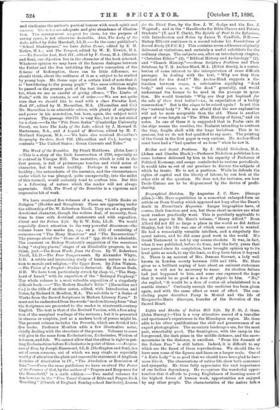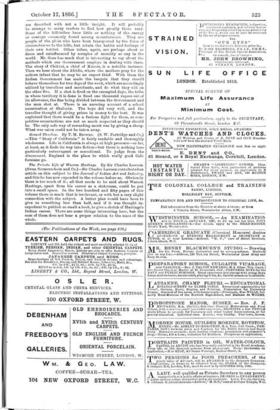Lights and Shades of Indian Hill Life. By F. St.
J. Gore. (John Murray.)—This is a very attractive record of a traveller and sportsman's experiences in the Himalayan region. Mr. Gore adds to his other qualifications the skill and perseverance of an expert photographer. The mountain landscapes axe, for the most part, remarkably good. The frontispiece, with the camp in the foreground, the dark pines in the middle distance, and the snow- mountains in the distance, is excellent. "From the Summit of the Zulum Pass" is still better. Indeed, it is difficult to say which are the finest of these reproductions. We should like to have seen some of the figures and faces'on a larger scale. One of "A. Kulu Lady" is so good that we should have been glad to have more like it. The observations of native life show both acuteness and sympathy. Mr. Gore fully appreciates the vast importance of our Indian dependency. He recognises the wonderful oppor- tunities that it affords to young Englishmen of learning some of the highest forms of human work, opportunities not enjoyed by any other people. The characteristics of the native tribza are described with not a little insight. It will probably be strange to many readers to find how greatly these vary. Some of the hill-tribes have little or nothing of the energy or courage commonly found among mountaineers. They are people of the plain who have been transported by the force of circumstances to the hills, but retain the habits and feelings of their own habitat. Other tribes, again, are perhaps about as fierce and uninfluenced- by scruples of morality as any in the world. Mr. Gore has much that is interesting to say about the methods which our Government employs in dealing with them. The story of Chikkai, a chief of Kuram, is a notable instance. Then we hear about the Afridis, where the mothers pray for the unborn infant that he may be an expert thief. With them the Indian Government has made the bargain that they should behave themselves for two days of the week, which are accordingly utilised by travellers and merchants, and do what they will on the other five. If a shot is fired on the exempted days, the tribe in whose territory it is done is fined one thousand rupees out of its allowance, the fine being divided between the Government and the man shot at. There is an amusing account of a school examination at Shalozrin. The boys did very well, and the traveller thought of giving prizes in money to the best. It was explained that there would be a furious fight for them, as com- petitive examinations are not as much respected as they should le. The only safe way of rewarding merit was by giving a sheep. What was eaten could not be taken away.







































 Previous page
Previous page